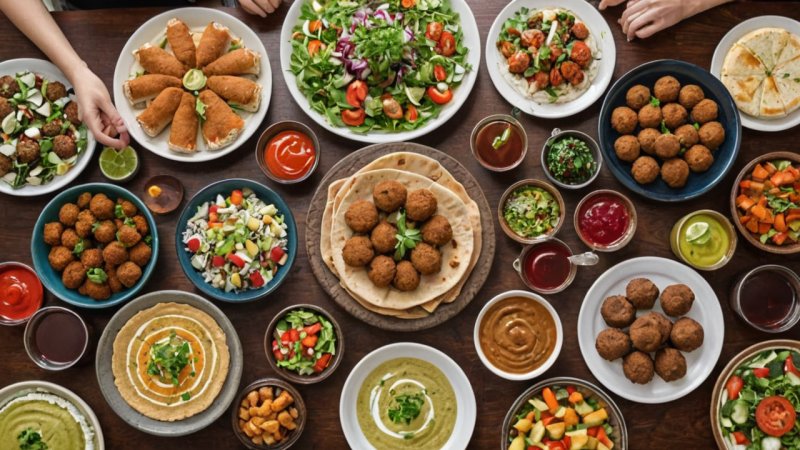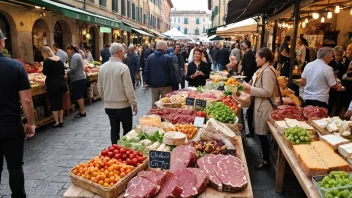The Middle East is a region renowned for its diverse and rich culinary heritage, drawing from a mix of cultures, traditions, and ingredients. From fragrant spices to fresh vegetables, Middle Eastern cuisine offers a plethora of flavors that tantalize the taste buds. This article aims to answer some common questions about Middle Eastern cuisine, providing insights for those eager to explore these culinary delights.
What are the key ingredients in Middle Eastern cuisine?
Middle Eastern cuisine utilizes a variety of ingredients, including:
- Spices: Cumin, coriander, sumac, cinnamon, and cardamom are commonly used.
- Herbs: Fresh herbs like parsley, mint, and dill are prevalent.
- Grains: Rice, bulgur, and couscous serve as staple carbohydrates.
- Legumes: Chickpeas, lentils, and fava beans are essential protein sources.
- Vegetables: Eggplants, tomatoes, and bell peppers feature prominently in many dishes.
What are some popular Middle Eastern dishes?
Some iconic dishes that represent Middle Eastern cuisine include:
- Hummus: A creamy dip made from blended chickpeas, tahini, lemon juice, and garlic.
- Falafel: Deep-fried balls made from ground chickpeas or fava beans, often served in pita bread.
- Kebabs: Grilled meat skewers, which can be made with beef, lamb, or chicken, marinated in spices.
- Tabbouleh: A refreshing salad made with parsley, tomatoes, bulgur, and a lemon-olive oil dressing.
- Baba Ghanoush: A smoky dip made from roasted eggplant, tahini, and garlic.
How is Middle Eastern cuisine influenced by culture and geography?
Middle Eastern cuisine is heavily influenced by the region's history, trade routes, and neighboring cultures. The fusion of flavors and cooking techniques comes from:
- Historical Trade: Spices and ingredients were exchanged along ancient trade routes, enriching local cuisines.
- Religious Practices: Dietary laws in Islam, such as halal, impact food preparation and consumption.
- Regional Specialties: Different countries (e.g., Lebanon, Turkey, Iran) have unique dishes reflecting local tastes and ingredients.
What are some traditional Middle Eastern cooking methods?
Middle Eastern cooking methods often include:
- Grilling: Many dishes, especially kebabs, are grilled over open flames for a smoky flavor.
- Slow Cooking: Stews and tagines are often cooked slowly to enhance flavor and tenderize meat.
- Frying: Dishes like falafel and sambusak (savory pastries) are typically deep-fried for a crispy texture.
- Baking: Flatbreads like pita are baked in traditional ovens, resulting in a fluffy texture.
Are there vegetarian options in Middle Eastern cuisine?
Yes, Middle Eastern cuisine offers a wide array of vegetarian options, including:
- Mezze: A selection of small dishes like hummus, baba ghanoush, and stuffed grape leaves.
- Vegetable Kebabs: Grilled skewers featuring marinated vegetables.
- Salads: Fresh salads, such as fattoush and tabbouleh, are often served as sides or main dishes.
- Legume-Based Dishes: Dishes like mujaddara (lentils and rice) and falafel are hearty and satisfying.
What drinks are commonly served with Middle Eastern meals?
Common beverages accompanying Middle Eastern meals include:
- Arabic Coffee: A strong, spiced coffee often served in small cups.
- Mint Tea: A sweet, refreshing tea infused with fresh mint leaves.
- Yogurt Drinks: Traditional drinks like Ayran (a yogurt and water mix) are served as coolers.
How can I experience Middle Eastern cuisine authentically?
To fully experience Middle Eastern cuisine:
- Visit Local Markets: Explore spice markets and local vendors for fresh ingredients.
- Attend Cultural Events: Participate in festivals or cooking classes that focus on Middle Eastern culinary traditions.
- Dine at Local Restaurants: Seek out authentic restaurants to savor traditional dishes prepared by skilled chefs.
In conclusion, Middle Eastern cuisine is a vibrant and flavorful journey that reflects the region's rich history and diverse cultures. By exploring its key ingredients, popular dishes, and unique cooking methods, you can gain a deeper appreciation for this culinary treasure. Whether you're a seasoned food lover or a curious traveler, the flavors of the Middle East are sure to leave a lasting impression.






